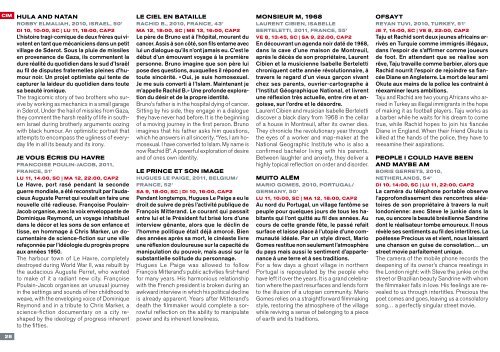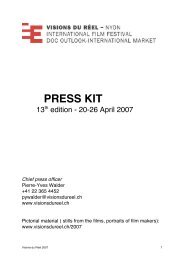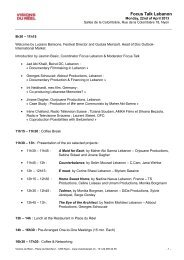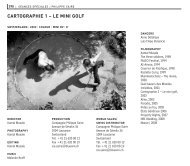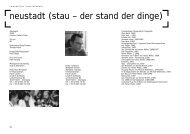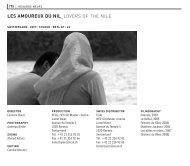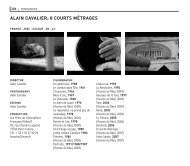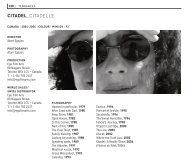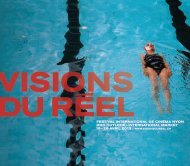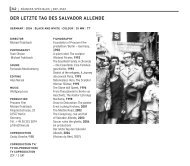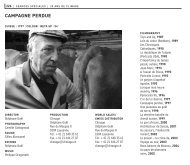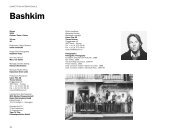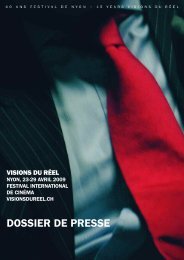2 - Visions du Réel
2 - Visions du Réel
2 - Visions du Réel
You also want an ePaper? Increase the reach of your titles
YUMPU automatically turns print PDFs into web optimized ePapers that Google loves.
CIMHULA AND NATANROBBY ELMALIAH, 2010, ISRAEL, 50’DI 10, 10:00, SC | LU 11, 18:00, CAP2L’histoire tragi-comique de deux frères qui vivotenten tant que mécaniciens dans un petitvillage de Sderot. Sous la pluie de missilesen provenance de Gaza, ils commentent la<strong>du</strong>re réalité <strong>du</strong> quotidien dans le sud d’Israëlau fil de disputes fraternelles pleines d’humournoir. Un projet optimiste qui tente decapturer la laideur <strong>du</strong> quotidien dans toutesa beauté ironique.The tragicomic story of two brothers who surviveby working as mechanics in a small garagein Sderot. Under the hail of missiles from Gaza,they comment the harsh reality of life in southernIsrael <strong>du</strong>ring brotherly arguments oozingwith black humour. An optimistic portrait thatattempts to encompass the ugliness of everydaylife in all its beauty and its irony.JE VOUS ÉCRIS DU HAVREFRANCOISE POULIN-JACOB, 2011,FRANCE, 51’LU 11, 14:00, SC | MA 12, 22:00, CAP2Le Havre, port rasé pendant la secondeguerre mondiale, a été reconstruit par l’audacieuxAuguste Perret qui voulait en faire unenouvelle cité radieuse. Françoise Poulain-Jacob organise, avec la voix enveloppante deDominique Reymond, un voyage inhabitueldans le décor et les sons de son enfance ettisse, en hommage à Chris Marker, un documentairede science-fiction sur une villerefaçonnée par l’idéologie <strong>du</strong> progrès propreaux années 1950.The harbour town of Le Havre, completelydestroyed <strong>du</strong>ring World War II, was rebuilt bythe audacious Auguste Perret, who wantedto make of it a radiant new city. FrançoisePoulain-Jacob organises an unusual journeyin the settings and sounds of her childhood toweave, with the enveloping voice of DominiqueReymond and in a tribute to Chris Marker, ascience-fiction documentary on a city reshapedby the ideology of progress inherentto the fifties.LE CIEL EN BATAILLERACHID B., 2010, FRANCE, 43’MA 12, 18:00, SC | ME 13, 16:00, CAP2Le père de Bruno est à l’hôpital, mourant <strong>du</strong>cancer. Assis à son côté, son fils entame aveclui un dialogue qu’ils n’ont jamais eu. C’est ledébut d’un émouvant voyage à la premièrepersonne. Bruno imagine que son père luipose des questions, auxquelles il répond entoute sincérité. « Oui, je suis homosexuel.Je me suis converti à l’Islam. Maintenant jem’appelle Rachid B.» Une profonde exploration<strong>du</strong> désir et de la propre identité.Bruno’s father is in the hospital dying of cancer.Sitting by his side, they engage in a dialoguethey have never had before. It is the beginningof a moving journey in the first person. Brunoimagines that his father asks him questions,which he answers in all sincerity. “Yes, I am homosexual.I have converted to Islam. My name isnow Rachid B”. A powerful exploration of desireand of ones own identity.LE PRINCE ET SON IMAGEHUGUES LE PAIGE, 2011, BELGIUM/FRANCE, 52’SA 9, 18:00, SC | DI 10, 16:00, CAP2Pendant longtemps, Hugues Le Paige a eu ledroit de suivre de près l’activité publique deFrançois Mitterand. Le courant qui passaitentre lui et le Président fut brisé lors d’uneinterview gênante, alors que le déclin del’homme politique était déjà amorcé. Biendes années après sa mort, le cinéaste livreune réflexion douloureuse sur la capacité demanipulation <strong>du</strong> pouvoir, mais aussi sur lasubstantielle solitude <strong>du</strong> personnage.Hugues Le Paige was allowed to followFrançois Mitterand’s public activities first-handfor many years. His harmonious relationshipwith the French president is broken <strong>du</strong>ring anawkward interview in which his political declineis already apparent. Years after Mitterand’sdeath the filmmaker would complete a sorrowfulreflection on the ability to manipulatepower and its inherent loneliness.MONSIEUR M, 1968LAURENT CIBIEN, ISABELLEBERTELETTI, 2011, FRANCE, 55’VE 8, 13:45, SC | SA 9, 22:00, CAP2En découvrant un agenda noir daté de 1968,dans la cave d’une maison de Montreuil,après le décès de son propriétaire, LaurentCibien et la musicienne Isabelle Bertelettichroniquent cette année révolutionnaire, àtravers le regard d’un vieux garçon vivantchez ses parents, ouvrier-cartographe àl’Institut Géographique National, et livrentune réflexion très actuelle, entre rire et angoisse,sur l’ordre et le désordre.Laurent Cibien and musician Isabelle Bertelettidiscover a black diary from 1968 in the cellarof a house in Montreuil, after its owner dies.They chronicle the revolutionary year throughthe eyes of a worker and map-maker at theNational Geographic Institute who is also aconfirmed bachelor living with his parents.Between laughter and anxiety, they deliver ahighly topical reflection on order and disorder.MUITO ALÉMMARIO GOMES, 2010, PORTUGAL/GERMANY, 50’LU 11, 10:00, SC | MA 12, 18:00, CAP2Au nord <strong>du</strong> Portugal, un village fantôme sepeuple pour quelques jours de tous les habitantsqui l’ont quitté au fil des années. Aucours de cette grande fête, le passé refaitsurface et laisse place à l’utopie d’une communautéidéale. Par un style direct, MarioGomes restitue non seulement l’atmosphère<strong>du</strong> pays mais aussi le sentiment d’appartenanceà une terre et à ses traditions.For a few days a ghost village in northernPortugal is repopulated by the people whohave left it over the years. It is a grand celebrationwhere the past resurfaces and lends formto the illusion of a utopian community. MarioGomes relies on a straightforward filmmakingstyle, restoring the atmosphere of the villagewhile reviving a sense of belonging to a pieceof earth and its traditions.OFSAYTREYAN TUVI, 2010, TURKEY, 51’JE 7, 14:00, SC | VE 8, 22:00, CAP2Taju et Rachid sont deux jeunes africains arrivésen Turquie comme immigrés illégaux,dans l’espoir de s’affirmer comme joueursde foot. En attendant que se réalise sonrêve, Taju travaille comme barbier, alors queRachid nourrit l’espoir de rejoindre sa fiancéeDiane en Angleterre. La mort de leur amiOkute aux mains de la police les contraint àréexaminer leurs ambitions.Taju and Rachid are two young Africans who arrivedin Turkey as illegal immigrants in the hopeof making it as football players. Taju works asa barber while he waits for his dream to cometrue, while Rachid hopes to join his fiancéeDiane in England. When their friend Okute iskilled at the hands of the police, they have toreexamine their aspirations.PEOPLE I COULD HAVE BEENAND MAYBE AMBORIS GERRETS, 2010,NETHERLANDS, 54’DI 10, 14:00, SC | LU 11, 22:00, CAP2La caméra <strong>du</strong> téléphone portable observel’approfondissement des rencontres aléatoiresde son propriétaire à travers la nuitlondonienne: avec Steve le junkie dans larue, ou encore la beauté brésilienne Sandrinedont le réalisateur tombe amoureux. Il nousrévèle ses sentiments au fil des intertitres. Lapoétesse Precious va et vient, nous laissantune chanson en guise de consolation… unstreet movie parfaitement unique.The camera of the mobile phone records thedeepening of its owner’s chance meetings inthe London night: with Steve the junkie on thestreet or Brazilian beauty Sandrine with whomthe filmmaker falls in love. His feelings are revealedto us through intertitles. Precious thepoet comes and goes, leaving us a consolatorysong… a perfectly singular street movie.28


